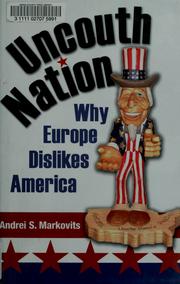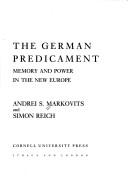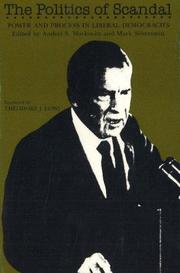| Listing 1 - 10 of 21 | << page >> |
Sort by
|

ISBN: 9780691122878 0691122873 9786612157240 1282157248 1400827299 9781400827299 Year: 2009 Publisher: Princeton, NJ
Abstract | Keywords | Export | Availability | Bookmark
 Loading...
Loading...Choose an application
- Reference Manager
- EndNote
- RefWorks (Direct export to RefWorks)
No survey can capture the breadth and depth of the anti-Americanism that has swept Europe in recent years. From ultraconservative Bavarian grandmothers to thirty-year-old socialist activists in Greece, from globalization opponents to corporate executives--Europeans are joining in an ever louder chorus of disdain for America. For the first time, anti-Americanism has become a European lingua franca. In this sweeping and provocative look at the history of European aversion to America, Andrei Markovits argues that understanding the ubiquity of anti-Americanism since September 11, 2001, requires an appreciation of such sentiments among European elites going back at least to July 4, 1776. While America's policies under George W. Bush have catapulted European anti-Americanism into overdrive, Markovits argues that loathing of America has long been driven not by what America does, but by what it is. Focusing on seven Western European countries, he shows how antipathies toward things American embrace aspects of everyday life (such as sports and language) that remain far from the purview of the Bush administration's policies. Aggravating Europeans' antipathies toward America is their alleged helplessness in the face of an Americanization that Europeans view as inexorably befalling them. More troubling, Markovits argues, is that this anti-Americanism has cultivated a new strain of anti-Semitism. Above all, he shows that while Europeans are far apart in their everyday lives and shared experiences, their not being American provides them with a powerful common identity--one that elites have already begun to harness in their quest to construct a unified Europe to rival America.
Anti-Americanism --- Europe --- United States --- Civilization --- American influences. --- Relations --- Antiamericanism --- Anti-amerikanisme --- American influences
Book
ISBN: 0521305136 Year: 1986 Publisher: Cambridge Cambridge University press
Abstract | Keywords | Export | Availability | Bookmark
 Loading...
Loading...Choose an application
- Reference Manager
- EndNote
- RefWorks (Direct export to RefWorks)
331.105 <430> --- Labor unions --- -#SBIB:316.334.2A419 --- Industrial unions --- Labor, Organized --- Labor organizations --- Organized labor --- Trade-unions --- Unions, Labor --- Unions, Trade --- Working-men's associations --- Labor movement --- Societies --- Central labor councils --- Guilds --- Syndicalism --- Verhouding wergevers-werknemers. Industrial relations. Arbeidsverhoudingen--z.o. {658.31}--?<430> --- History --- Arbeidssociologie: Europees en wereldsyndicalisme --- 331.105 <430> Verhouding wergevers-werknemers. Industrial relations. Arbeidsverhoudingen--z.o. {658.31}--?<430> --- #SBIB:316.334.2A419
Book
ISBN: 9633864224 Year: 2021 Publisher: New York : Central European University Press,
Abstract | Keywords | Export | Availability | Bookmark
 Loading...
Loading...Choose an application
- Reference Manager
- EndNote
- RefWorks (Direct export to RefWorks)
"This is the story of an illustrious Romanian-born, Hungarian-speaking, Vienna-schooled, Columbia-educated and Harvard-formed, middle-class Jewish professor of politics and other subjects. Markovits revels in a rootlessness that offers him comfort, succor, and the inspiration for his life's work. As we follow his quest to find a home, we encounter his engagement with the important political, social, and cultural developments of five decades on two continents. We also learn about his musical preferences, from classical to rock; his love of team sports such as soccer, baseball, basketball, and American football; and his devotion to dogs and their rescue. Above all, the book analyzes the travails of emigration the author experienced twice, moving from Romania to Vienna and then from Vienna to New York. Markovits's Candide-like travels through the ups and downs of post-1945 Europe and America offer a panoramic view of key currents that shaped the second half of the twentieth century. By shedding light on the cultural similarities and differences between both continents, the book shows why America fascinated Europeans like Markovits and offered them a home that Europe never did: academic excellence, intellectual openness, cultural diversity and religious tolerance. America for Markovits was indeed the "beacon on the hill," despite the ugliness of its racism, the prominence of its everyday bigotry, the severity of its growing economic inequality, and the presence of other aspects that mar this worthy experiment's daily existence"--
Universities and colleges --- Jews --- Jews, Romanian --- Faculty --- Cultural assimilation --- Markovits, Andrei S. --- United States. --- Romania --- New York (State) --- Timișoara (Romania) --- Memoir, Emigration, Identity, Central Europe, Intellectual life, US, Popular culture, Jewish culture.
Book
ISBN: 904109086X Year: 1998 Publisher: Antwerpen Icarus
Abstract | Keywords | Export | Availability | Bookmark
 Loading...
Loading...Choose an application
- Reference Manager
- EndNote
- RefWorks (Direct export to RefWorks)
Welke rol speelt het nieuwe, verenigde Duitsland in de 21ste eeuw? Vormt het opnieuw een bedreiging voor Europa? Wordt de militaire overheersing uit het verleden in de toekomst vervangen door een economische en culturele dominantie? Hoe gaan de Duitsers om met de holocaust? Hoe kijken de kleine buurlanden en de andere Europese zwaargewichten aan tegen het nieuwe Duitsland? Wat zijn de krijtlijnen van de Duitse buitenlandse politiek? Twee Amerikaanse politicologen trachten een antwoord te vinden op deze vragen. Uiteraard komt hierbij de rol van Duitsland in het Europese eenwordingsproces uitgebreid aan bod en vooral de economische argumenten worden met heel wat cijfermateriaal onderbouwd. Het ligt iets moeilijker als het bv. over de houding van de buurlanden ten opzichte van de Duitse eenwording gaat, waar men vaak vervalt in een oppervlakkig opsommen van een aantal historische feiten en enkele opiniepeilingen. De resultaten van zo'n methode laten zich raden.
International relations. Foreign policy --- Germany --- Allemagne --- Duitsland --- Politiek --- Politique --- Duitsland ; politiek --- #KVHA:Politiek; Duitsland --- #KVHA:Economie; Duitsland --- 327 --- Buitenlandse politiek --- Internationale politiek. Buitenlandse politiek --- 820 Internationale Betrekkingen --- 830 Economie --- 841 Politiek Bestel --- 842 Media --- 860 (Vredes)cultuur --- 884.1 Oost-Europa --- 884.4 West-Europa

ISBN: 0801428025 Year: 1997 Publisher: Ithaca (N.Y.) : Cornell university press,
Abstract | Keywords | Export | Availability | Bookmark
 Loading...
Loading...Choose an application
- Reference Manager
- EndNote
- RefWorks (Direct export to RefWorks)
Political culture --- Germany --- Politics and government --- 1990 --- -Germany --- Relations --- Europe
Book
ISBN: 9780691137513 069113751X Year: 2010 Publisher: Princeton : Princeton University Press,
Abstract | Keywords | Export | Availability | Bookmark
 Loading...
Loading...Choose an application
- Reference Manager
- EndNote
- RefWorks (Direct export to RefWorks)
Sports et mondialisation --- Nationalisme et sports --- Sports --- Sports and globalization --- Nationalism and sports --- Aspect politique --- Political aspects --- Nationalisme et sports.
Book
Abstract | Keywords | Export | Availability | Bookmark
 Loading...
Loading...Choose an application
- Reference Manager
- EndNote
- RefWorks (Direct export to RefWorks)

ISBN: 0841910979 Year: 1988 Publisher: New York (N.Y.): Holmes and Meier
Abstract | Keywords | Export | Availability | Bookmark
 Loading...
Loading...Choose an application
- Reference Manager
- EndNote
- RefWorks (Direct export to RefWorks)
Comparative government --- Democracy --- Political corruption
Book
ISBN: 9781400834662 Year: 2010 Publisher: Princeton, NJ
Abstract | Keywords | Export | Availability | Bookmark
 Loading...
Loading...Choose an application
- Reference Manager
- EndNote
- RefWorks (Direct export to RefWorks)
Book
ISBN: 9789633864227 Year: 2021 Publisher: Budapest New York
Abstract | Keywords | Export | Availability | Bookmark
 Loading...
Loading...Choose an application
- Reference Manager
- EndNote
- RefWorks (Direct export to RefWorks)
| Listing 1 - 10 of 21 | << page >> |
Sort by
|

 Search
Search Feedback
Feedback About UniCat
About UniCat  Help
Help News
News